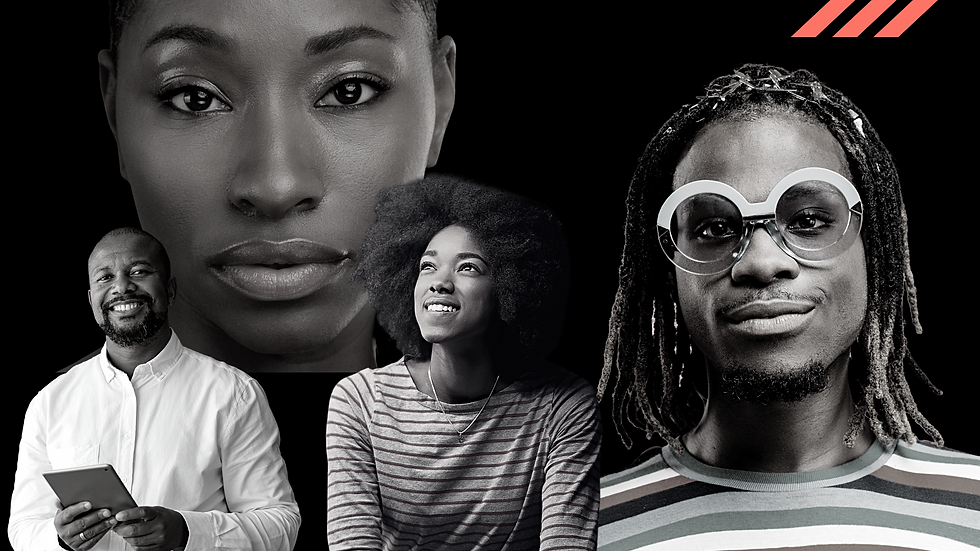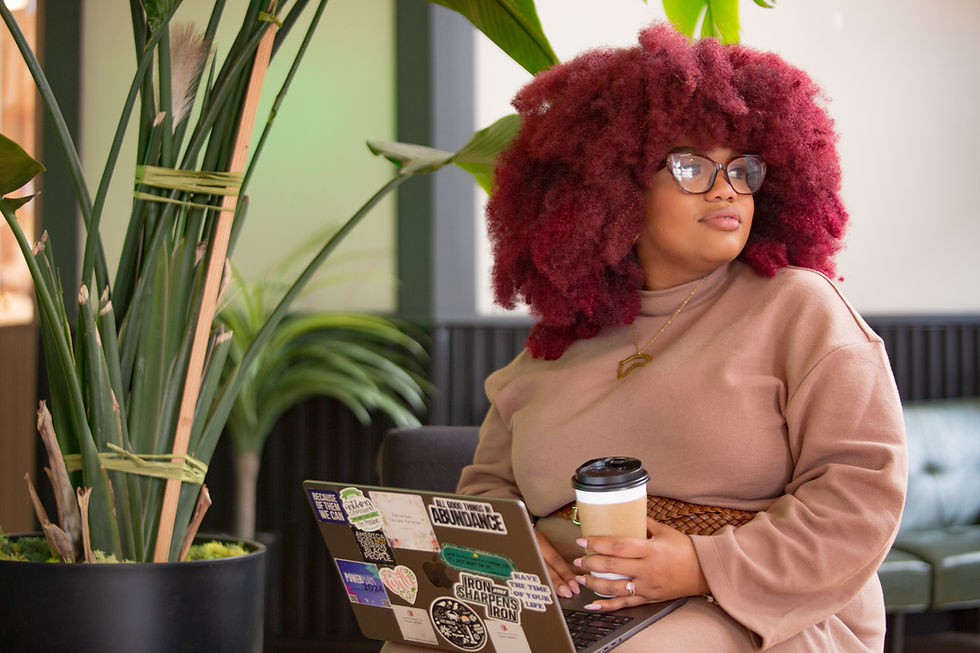We Don’t Just Need More Black Businesses & Leaders...
- Brittany Janay

- May 31, 2022
- 6 min read
We Need Black Businesses & Leaders Rooted in Love x Liberation

“..It is not too late for [B]lack people to return to love, to ask again the metaphysical questions commonly raised byBlack artists and thinkers during the hey day of freedom struggles, questions about the relationship between dehumanization and our capacity to love, questions about internalized racism and self hatred.
...without a sound emotional foundation material privilege easily corrupts. Gaining access to material privilege will never satisfy needs of the spirit...Needs of the spirit can only be satisfied when we care for the soul. Our ancestors knew this. Only a politics of conversion where we return to love can save us.”
bell hooks, salvation: BLACK PEOPLE AND LOVE
If I am being real, working for a Black owned business has always felt more “pinnacle” than starting my own. For me, there is something beautiful about building upon and co-evolving another Black person’s legacy…
…tending to the soil.
…nurturing what has been planted.
…planting a few seeds of my own along the way.
In a dominant culture of individualism, hyper competition and power hoarding, something about that felt radical, spiritual even. Something about that felt…true.
I think there is such a thing as creating or building “in excess.” At one point, I felt like everybody and their mom was starting an LLC, 501c3, new programming or initiatives, leading to siloed, duplicative efforts, and a context that valued competition over community building, a culture of hustle and grind over community care, and missed opportunities to fully imagine and operationalize what it means to be part of a broader ecosystem.
I’ve also observed definitions of success and growth limited to a focus on breadth and scale (aka “doing the most”) over depth and connection. Very practically, this looks like entrepreneurs (with the best of intentions) wanting to be “everything to everybody,” prematurely scaling or taking on new work beyond institutional capacity rather than an intentional focus on “staying in one’s lane,” and partnering with others who may be gifted in areas where we lack.
All this to say … this influences how I defined and came to expand my understanding of what it means to be a leader or entrepreneur. Entrepreneurship and leadership shouldn’t be limited to starting something new; anymore than it is also building upon what’s already there. I believe this mindset or reframe requires a certain degree of humility, love, commitment, and sacrifice. I know this intimately.
When I joined The Winters Group, a Black woman owned business, the institution, though in its 30th year, was something like a “start-up” in its current iteration. It was what I refer to as “fertile ground.” I had no ulterior motive other than the desire to build, plant, nou
rish, plow…plant some more. Having a Black person, better yet a Black woman “signing my paycheck” felt like a peak to me… it felt like enough.
Experiencing the gift of building upon, while also evolving myself was [is] divine. Working in a context where the “work” was so deeply connected to what I believed to be my purpose, while simultaneously using my gifts and talents to partner with institutions and amplify the work of my elder felt like my own version of “changing the world.” It still does.
I’ve worked in both Black-led spaces and white institutions. In my experience, there Is a sense of personal commitment, emotional investment and intrinsic value when working in the former. It feels, or at least is supposed to feel, at home. When I use the language of “home,” I am referring to some of the conditions I associate with my own home: safety, spiritual covering, community, accountability …love. I appreciate bell hooks’ definition (or ingredients) of love for this context: care, compassion, trust, respect, knowledge and recognition. I love it when she affirms the radical nature of love in praxis …
”Domination cannot exist in any social situation where a love ethic is present.” bell hooks
We don’t just need more Black owned businesses, entrepreneurs and leaders. We need more Black entrepreneurs and leaders committed to embodying their leadership as a love ethic, a love practice. We need more Black businesses that are rooted in love and liberation.
White supremacy, colonialism, capitalism, classism, elitism, nepotism, ableism (and all their other cousins and ‘em) have their way of showing up even in our spaces, even when the “white face” isn’t in the room. Though in most cases the dynamics may be more subtle, when they rear their heads, I can attest…
it hit different.
Likewise, it can be difficult to discern, name, and contend with for a number of reasons:
A business landscape rooted in exploitative capitalism, anti-Blackness, and white supremacy makes it difficult for Black entrepreneurs to just “get by” sometimes. Black entrepreneurs are less likely to have access to capital and credit. Not only are we busy trying to build businesses, we’re trying to do so in an oppressive context that was set up for us to fail.
While striving to prioritize the operational components of building a business, we’re not always setting aside time nor the appropriate amount of resources to build, evolve, and nurture ourselves. Not to mention, most "development" programs prioritize an "assimilation-focus" -- what you gotta do to 'get ahead and stay head,' with little attention to 'who you should strive to BE as to not lose yourself along the way.'
Race based trauma under the system of white supremacy and while in harmful corporate environments can go unhealed. Unfortunately, that can lead to us projecting our unhealed traumas on others with whom we are in community, and not eeeeeeven know. Lack of attention to our own healing, coupled with the historical lack of access to mental health care and mistrust of the healthcare institution complicates this.
When working in diversity, equity, inclusion (DEI) and other change making capacities, we often find the work being so focused on white folks, companies and institutions that Black bodies are often fatigued or not checking for how some of the same harmful systems of oppression can be perpetuated, embodied by…US.
As a communal people, sometimes it just feels good to support our own, and it creates this dynamic where we may be excessively “protective” of those we see as impactful, significant, “arriving “.. so much so that we position them as beyond reproach.
Perhaps there are other factors and nuances that make discerning and disrupting systems of oppression in our own spaces difficult. These are simply my anecdotal observations and personal truths. I want to be clear here: Each of these are manifestations of the impact of white supremacy and anti-blackness; we are not defective--the structure is. These complicated dynamics are not easily “fixable.” There is no “checklist” nor quickfastandinaHurry way to address centuries long, intergenerational manifestations of harm and oppression.
AND…
I believe, with time and commitment to loving accountability, we can return. We can create spaces, businesses, “homes” within our institutions that are rooted in our values, that are rooted in love x liberation.
That’s our work, and we deserve to engage in it.
I consider myself a perpetual wonder(er). I believe I have more questions than I do answers in most cases. I experience this as a gift. A posture of wonder allows me to remember what’s been ripped from my cultural memory and forgotten about myself, my identity and Blackness; unlearn harmful dominant cultural norms that do not serve my humanity; and ultimately redefine power, what it means to be a leader, steward, and entrepreneur.
My wonder is a gateway to reimagining different.
I feel like we all deserve that.
So, for the folks who appreciate a dose of pragmatism with their serving up of theory and imagination … What might this work look like, feel like, yield in outcomes?
It looks like communities of Black leaders & entrepreneurs immersing themselves in the thought leadership and wisdom of our elders and ancestors. It looks like moving beyond the mainstream “HBRs” and Deloitte “white” papers,” and white academia to understand who we are and should be as humans and Black bodies. It looks like interrogating our proximity to power, getting curious about how we've caused harmed and internalized some of the same norms that have never served us.
It feels challenging, maybe even uncomfortable or unrealistic because we are used to building and creating within the confines of the white imagination, oppressive systems and structures that suggest our ways of being “just wouldn’t work” or “won’t be received.” It also feels affirming, restorative, a loving reminder, joy. It feels like growth.
The outcomes? Black founders, Black leaders, Black entrepreneurs who are not just building and leading, but building and leading differently, embodying their leadership as a love practice; co-creating systems and strategies that narrow the gap between what we believe and how we show up in this world.
“For the master’s tools will never dismantle the master’s house. They may allow us to temporarily beat him at his own game, but they will never enable us to bring about genuine change.”
-Audre Lorde
In the spirit of Loving Accountability,
Brittany Janay
PS. I am working on something. If this resonated with you or might resonate with a Black leader, entrepreneur or change maker in your sphere, share this post and stay in the loop on my next love project by tapping in here.




Comments